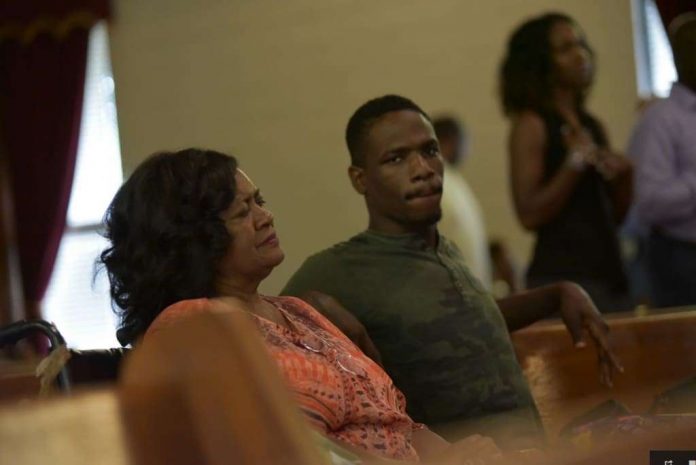Bilal Quintyne, 24, decided to help Belinda Whitaker by pushing her wheelchair all the way home.
Bilal Quintyne sat in a church he’d never been to before and heard the pastor praise him.
The 24-year-old amateur boxer is not a religious man, but he believes in God, and one day in early May he felt a call. Preparing for a training run in Smyrna, Georgia, he noticed an older woman sitting in a wheelchair by the side of the road. The chair was stuck, and she could not move.
“She kind of had a blank look,” he recalled. “I just asked her, ‘Are you okay?’ ”
The woman, 67-year-old Belinda Whitaker, told him that she had been there for 45 minutes since her wheelchair motor conked out. She was within a few steps of a church and a carwash. But aside from a passerby who had helped her back into her chair after she was thrown to the ground by the initial jolt, no one had offered assistance.
So she asked Quintyne: Would he call someone to help?
“I’ll do you one better,” he said. “God blessed me with an able body. I’ll push you home.”
Whitaker was skeptical. She says she thought, “Yeah, sure, he says that, but after he gets going he’s going to say, ‘This is too much for me.’ ”
Whitaker, a semiretired real estate agent who had polio as a child, had set out from her senior housing complex that day to do some shopping. Her electric wheelchair had recently gotten a new battery, and after it stopped, she jiggled some wires to try to find a connection, but it wouldn’t move.
“I was sitting there thinking, ‘What should I do? Should I call the police?’ ” she said. “I put my head down and said, ‘Dear God, dear God, please find somebody safe to help me out.’ The next thing I know, Bilal shows up.”
Her home was a 30-minute walk, and the wheels on the 360-pound chair had seized up, making it harder to push for the first part of the journey. Along the way, Quintyne’s trainer, Tony Willingham, drove up expecting to do a training session. He saw what was going on and started filming it.
“He just said he was taking her home,” Willingham said. “He just does stuff like that. That’s who that kid is.”
By the time he got her home, Quintyne was sweating. Whitaker hugged him anyway, and he went on his way.
Then he posted Willingham’s video on his Facebook page, and it went viral. It garnered 3.4 million views, and he got calls from all over the world. But until last week, he didn’t know who Whitaker was and she didn’t know who he was.
That changed when a friend of Quintyne’s saw Whitaker getting a coffee at a local gas station and recognized her as the woman in the video.
Coincidentally, the same week, Stephan Bell, a pastor at the Divine Order Church in nearby Marietta, saw the video on Facebook.
“Wait a minute, I know that person,” Bell thought. Whitaker was a member of his congregation, and he called her.
“Do you know about a video of you being pushed in your chair?” he said.
She didn’t.
“Well, it’s viral,” he said.
Whitaker and Quintyne reconnected last week, and she invited him to church on Sunday. He was overwhelmed by the reception.
“They gave me a plaque,” Quintyne said. “The pastor said, ‘That’s what it’s about, taking care of your community. Not just sitting there and talking about God, but going out and practicing what you preach.’ ”
The church also presented him with a church T-shirt and a $25 gift card to the Cheesecake Factory; he plans to surprise his two children, 4 and 6, with a trip there this week.
“I just felt so much love,” he said. “I don’t see myself as no superhero, I don’t see myself as no great guy. I’m just a moral man doing what I was put on this Earth to do.”
To Bell, Quintyne’s act offers a model for his congregants and a view of young African American men that is different from what is usually seen on TV.
“As I look at America, there are so few stories that say there are still such things as being a good neighbor, there are still such things as sacrifice, there are still such things as caring, there are still such things as sending a message out saying, ‘I’m not too busy,’ ” he said. “I thought that message was worth sharing with our congregation – that there are still these belief systems that America was built on.”
In particular, “it shifts the paradigm from African American males hurting each other and hurting other people,” Bell said. “This story is a little bit different. The world should know that Bilal Quintyne exists, and that might spur people to pay it forward, to say, ‘Hey, I want to do that for someone else.’ “















